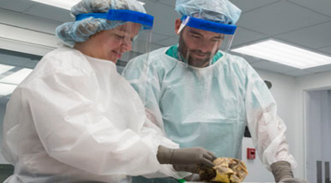
The goal of the Pathologists' Assistant (PathA) program is to prepare every student to think critically and practice pathology competently in diverse environments. The program is designed to build pathology knowledge, enhance practice, and foster professional integrity. To meet this goal, certain functional abilities are essential to ensure safe, effective practice during clinical training activities. Therefore, the faculty has determined that certain technical standards are requisite for admission, progression, and graduation from the Pathologists' Assistant (PathA) program.
Clinical Training Considerations
In addition to classroom learning, clinical learning occurs throughout the program and involves considerations (such as patient safety and clinical facilities) that are not present for classroom accommodations. For this reason, any applicant or student who seeks accommodations prior to or immediately after enrolling in the Pathologists' Assistant (PathA) program must also consider requesting assessment of the types of reasonable accommodations needed for the clinical training component of the program.
Drexel’s Pathologists’ Assistant program stood out to me from the beginning of my search. The curriculum focuses on making connections between what is learned in the classroom and practical applications during rotations. Students are taught how to apply their knowledge rather than simply memorizing.
Rachel Olk
Class of 2023
Summary of Technical Standards
An individual must be able to independently, with or without reasonable accommodation, meet the following technical standards of general abilities and those specifically of:
- Observation
- Communication
- Motor
- Intellectual, conceptual, integrative and quantitative abilities
- Essential behavioral, emotional and social attributes
Individuals unable to meet these technical standards, with or without reasonable accommodation, will not be able to complete the program and are counseled to pursue alternate careers. View a further explanation of the technical requirements.
Should you need to request accommodations to achieve these standards, please contact:
Office of Disability Resources
3141 Chestnut Street, Suite 228
Philadelphia, PA 19104
Phone: 215.895.1401
TTY: 215.895.2299
Email: disability@drexel.edu
Requirements - Admission, Academic Progression and Graduation
Observation
Candidates must be able to observe close up and from a distance. In a clinical situation, visual skills are essential when using a microscope and when performing the gross examination of tissues in a normal and pathological state. Observation requires visual, auditory, and somatic sensation while being enhanced by the functional use of other sensory modalities. Each student must possess a good sense of visual discrimination, especially as it relates to numbering (specimens, cassettes, tissue blocks, etc.) and differentiating colors which are essential to accurate gross descriptions. Comprehending spatial relationships in three dimensions is also critical in all aspects of the work of a pathologists' assistant.
Communication
Each student must possess the functional use of the English language, since all instructions and knowledge-based education is in this format. Oral dictations, hence transcription by a third party, must be comprehensible. Written reports, transcripts, and protocols are commonplace and often times required. All such written documents must be comprehensible. A good solid command of the English language is imperative for these functions to be accomplished.
Physical and Motor
Each student must possess sufficient fine motor skills and manual dexterity to perform careful, precise and accurate dissections of organs and tissues. A certain degree of motor strength is necessary for autopsy evisceration. Each student must possess the physical capability to lift and/or cause to move cadavers. Sufficient overall motor strength and coordination is required for many aspects of the profession.
Intellectual, Conceptual, Integrative and Quantitative
All students in the pathologists' assistant program must possess problem-solving abilities and have the intellectual ability to learn, integrate, analyze and synthesize data. The ability to concentrate is essential in maintaining specimen integrity in a very busy work environment such as the autopsy or surgical pathology laboratories.
Essential Behavioral, Emotional and Social
Consistent and dependable attendance is essential for the didactic and clinical phases of the training. Each student must always possess the necessary alertness to perform efficiently, accurately, and safely in the laboratory. Solid interpersonal skills are necessary in exercising good judgment in a professional and caring way in addition to interacting with professional and hospital staff, university personnel and the general public in a diplomatic manner. Each student must exhibit good personal grooming habits, including personal hygiene and selection of appropriate apparel, to be in accordance with the stated university and hospital policies. Finally, each student must possess the emotional health and stability to deal with death, dead bodies, and body parts, which are an integral part of this training.
Safety Standards
Exposures to infectious cases, such as CJD, HIV, TB, Hepatitis B, C, D, and other agents are quite common.
According to OSHA, contact lenses can be a safety hazard, since some degree of chemical exposure (fumes from formalin, xylene, alcohol, etc.) may be a common occurrence. Contact lenses may be a safety threat if chemical or biological splashes occur, since the lens can trap the inciting factor/agent and preclude effective rinsing.
The safety factor in the utilization of scalpels, razor blades, knives and scissors is critical.
Chemical fumes (formalin fixative), latex or talc powder may elicit allergic reactions.
Contact Information
How to apply to the Pathologists' Assistant program
Back to Top